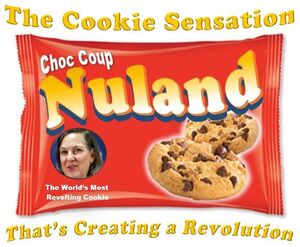EuroMaidan
Please rework this to show the hand of the deep state.
 US deep state actor Victoria Nuland handed out cookies to the protesters | |
| Date | 21 November 2013 - 2014 |
|---|---|
| Location | Ukraine |
| Sponsors | Open Society Foundations |
| Interest of | Mark Paslawsky |
| Inspired | 2022 Russian invasion of Ukraine |
| Subpage | •EuroMaidan/Sniper shootings |
| Description | Ukraine coup of 2014 |
EuroMaidan or the Maidan Uprising was a wave of demonstrations and civil unrest in Ukraine, which began on 21 November 2013 with large protests in Maidan (Independence Square) in Kyiv.
Official narrative
The protests were sparked by the Ukrainian government's sudden decision not to sign the European Union–Ukraine Association Agreement, instead choosing closer ties to Russia and the Eurasian Economic Union. Ukraine's parliament had overwhelmingly approved of finalising the Agreement with the EU, while Russia had put pressure on Ukraine to reject it. The scope of the protests widened, with calls for the resignation of President Viktor Yanukovych and the Azarov Government. The protesters opposed what they saw as widespread government corruption, the influence of oligarchs, abuse of power, and violation of human rights in Ukraine. Transparency International named Yanukovych as the top example of corruption in the world. The violent dispersal of protesters on 30 November caused further anger.[1]
During the uprising, Independence Square (Maidan) in Kyiv was a huge protest camp occupied by thousands of protesters and protected by makeshift barricades. It had kitchens, first aid posts and broadcasting facilities, as well as stages for speeches, lectures, debates and performances. It was guarded by 'Maidan Self-Defence' units made up of volunteers in improvised uniform and helmets, carrying shields and armed with sticks, stones and petrol bombs. Protests were also held in many other parts of Ukraine. In Kyiv, there were clashes with police on 1 December; and police assaulted the camp on 11 December. Protests increased from mid-January, in response to the government introducing draconian anti-protest laws. There were deadly clashes on Hrushevsky Street on 19–22 January. Protesters occupied government buildings in many regions of Ukraine. The uprising climaxed on 18–20 February, when fierce fighting in Kyiv between Maidan activists and police resulted in the deaths of almost 100 protesters and 13 police.[2]
As a result, an agreement was signed on 21 February 2014 by Yanukovych and leaders of the parliamentary opposition that called for the creation of an interim unity government, constitutional reforms and early elections. Shortly after the agreement, Yanukovych and other government ministers fled the country. Parliament then removed Yanukovych from office and installed an interim government. The Maidan Uprising was soon followed by the Russian annexation of Crimea and pro-Russian unrest in Eastern Ukraine, eventually escalating into the Russo-Ukrainian War.[3]
Related Quotations
| Page | Quote | Author | Date |
|---|---|---|---|
| Jean Bricmont | “We often hear that the left-right opposition is outdated or no longer makes sense. But the problem is worse: on many issues, the left-right opposition has reversed itself, the left adopting positions that were those of the right or the far-right in the past and part of the right doing the opposite. Let's start with the question of peace and war. Since the wars have become "humanitarian", it is the left, including the bulk of the "radical" left, which supports them. When a perfectly orchestrated coup takes place in Ukraine, we celebrate the victory of democracy. In Syria, until recently, support, at least verbal, for the "rebels" was not debated in the left. During the bombings on Libya, Mélenchon argued that it was necessary to prevent the "tyrant" Gaddafi from killing the revolution. We realized a little late that the opponents of the said tyrant, like the bulk of the rebels in Syria, were also our opponents, that is to say fanatical Islamists. But the classical left, at least in its radical part, but sometimes also in a certain part of social democracy, was opposed to imperial policies, interference and American hegemony, especially during the Vietnam War. Today, the simple fact of defending the principle of national sovereignty passes for being far-right.” | Jean Bricmont | January 2017 |
| Crimea | “This scum should be given promises, guarantees, and any concessions...And hung...They should be hung later.” | Boris Filatov | 2014 |
Related Document
| Title | Type | Publication date | Author(s) | Description |
|---|---|---|---|---|
| File:IAP Maidan Investigations Review.pdf | report | 31 March 2015 | Maidan IAP | Report of the Council of Europe International Advisory Panel on its review of the Maidan Investigations. It focuses on the 12 month period following the February 2014 coup. |
References
Wikipedia is not affiliated with Wikispooks. Original page source here
